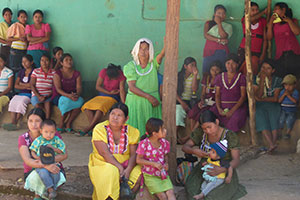20 October 2015
Urgent change needed to protect indigenous communities in Guatemala
As Guatemalans head to the polls this weekend, a report co-authored by a University of Essex researcher calls for urgent action to protect the human rights of the country’s indigenous peoples.
With the second-round presidential elections on 25 October, Visiting Professor Julian Burger hopes a change of leadership could “open a new era of peace and prosperity” for the country “as opposed to the violence and corruption that have typified recent governments.”

The Cho'rti' community. Picture courtesy: Monica Feria-Tinta
In the report, commissioned by Open Society Foundations, Professor Burger of Essex’s world-leading Human Rights Centre, focuses on the case of the indigenous Maya Cho’rti’ community.
The Cho’rti’ have been campaigning for seven years against a proposed hydro-electric dam project which they fear could affect their livelihoods and threaten their way of life. Theirs is just one example of the wider problems experienced by indigenous communities in the Central American country.
“Guatemala is beset by conflicts between local communities and the authorities, often ending in violence, criminalisation of legitimate protest and sometimes loss of life. Most often this is caused by potentially disruptive large-scale projects being pushed through without consultation” explained Professor Burger.
However, “this is a case where positive steps could still be taken by the authorities and the company to restore confidence and consult in good faith. We are hoping that it could be turned into a model of good practice” he added.
Professor Burger, who, for more than 20 years, headed the indigenous peoples and minorities programme at the United Nations in Geneva, added: “The case of the Cho’rti’ is not exceptional. Throughout the region, indigenous peoples are opposing these kinds of large-scale projects which are imposed without proper consultation despite most states being legally required to carry them out. Hydro and extractive projects are the source of the principal human rights violations affecting indigenous peoples.”
Professor Burger was part of a fact-finding delegation of three experts who visited the Chiquimula region of Guatemala in May, to meet with key actors on both sides of the conflict. Working with barristers Monica Feria-Tinta and Claire McGregor, Professor Burger spent a week in the region investigating the case.
Professor Burger said: “We recommend that the international commitments that the state has agreed to should be respected and implemented nationally which in some cases will require adapting specific laws and clarifying procedures for consultation.”
Despite ratifying International Labour Organisation Convention 169 on indigenous and tribal peoples, which should make provisions for consultation a legal requirement, the Guatemalan government has failed to develop a framework for consultation. This has resulted in authorities and businesses often claiming that they are not obliged to carry out anything more than basic information sessions within local communities.
Read the report in full.
...more news releases